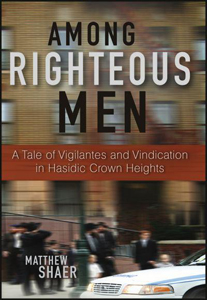Earlier this week, Matthew Shaer wrote about the genesis of his book, Among Righteous Men, and divisions within the Crown Heights community. He has been blogging here all week for Jewish Book Council and MyJewishLearning.
 In December, not long after Among Righteous Men was published, I returned to Crown Heights. The evening was unseasonably warm, and I walked east from my apartment, past the lip of Prospect Park, and down the undulating clamor of Eastern Parkway, my hands in my pockets. The neighborhood, where I had spent so many months reporting — some happy, some not — appeared largely unchanged.
In December, not long after Among Righteous Men was published, I returned to Crown Heights. The evening was unseasonably warm, and I walked east from my apartment, past the lip of Prospect Park, and down the undulating clamor of Eastern Parkway, my hands in my pockets. The neighborhood, where I had spent so many months reporting — some happy, some not — appeared largely unchanged.
There was the proud façade of the main shul at 770 Eastern Parkway, and there were the clusters of yeshiva students. There in the windows of one building hung the yellow flag of the messianists — believers in the divinity of Menachem Mendel Schneerson, the late Rebbe of Lubavitch. In a balcony overlooking the sidewalk, two women were chattering happily in Yiddish. I remembered a snippet from Alfred Kazin’s A Walker in the City, the best book about Brooklyn ever written: “Yet as I walk those familiarly choked streets at dusk and see the old women sitting in front of the tenements, past and present become each other’s face; I am back where I began.”
Kazin knew that an emotional connection to place can defeat mere geography. It is the not the physicality of a neighborhood that haunts us, after all. It is the connection between that physicality and our inner lives.
I strolled south down Kingston, towards Empire Boulevard. I had a single destination in mind: a tailoring shop owned by a man named Israel Shemtov. During the ‘70s and ‘80s, when crime rates in the neighborhood were skyrocketing, Shemtov had patrolled Crown Heights under the name the “Red Devil.” He was one of the first Jewish vigilantes – – a predecessor to the Shomrim and Shmira patrols active in the neighborhood today.
Shemtov, who stands just about five feet tall, was also a master of image management. Where other Hasidim shirked press attention, he embraced it, regaling reporters from the Post and the Daily News with tales of bloody brawls and daring midnight takedowns. He compared himself frequently to Charles Bronson, circa Death Wish. “There will not be a crime in the neighborhood because they know they will be dead,” he said.
In 2010, I had visited Shemtov at his storefront on Empire. By then, he was two decades retired, pale and stooped. Jamming a soft pack of Kingstons into his front pocket, he showed me into his private office, and pulled the door shut behind him. The room was in appalling condition — water damage had browned half the ceiling, and near the only window, several panels hung loose, exposing a nest of wires and cotton-candy pink insulation. “Sit,” Shemtov said.
For the next two hours, he told me dozens of stories, and sometimes the same story twice: The time he saved the life of a shooting victim; the time he faced down a gang of local toughs; the time he yanked a suspected mugger off a bicycle and beat the kid into the ground with his fists.
“I’ll tell you, since I was a kid, I was a very tough — I was ten years old, and two kids on my bicycle knocked off my helmet,” he said. “I was a little shit. They said, come over here, I want to talk to you. And I came over and beat the hell out of them. I was strong. I still am, thank God.”
Toughness was necessary for a Jew, he explained — “We’ve been knocked around for too long.” During the 1920s, his father’s family had fled Eastern Europe for New York; behind them, there was only death and destruction. “Because of that,” Shemtov said, “I knew I always had to fight.”
Now, months after that 2010 interview, I found myself galloping faster down Kingston, hoping Shemtov had a few more stories left to tell. But when I arrived at the corner of Empire, I found the storefront dark, the door locked. I knocked several times; there was no answer.
That evening, I phoned my grandmother at her home in Boston. During the year I spent writing Among Righteous Men, I had often considered interviewing my grandmother about her mother, Edith, who, much like many of the older Hasidim in Crown Heights, had escaped Eastern Europe under terrible circumstances. For a variety of reasons, I had never gotten around to making the call, but now that the book was behind me, I decided that the timing was right.
My grandmother was good-natured about the inquiry. She told me her mother had long blocked out the worst memories of her girlhood in Eastern Europe; and yet, over time, some details had emerged. Edith Springer — later Edith Rosenthal — had grown up in an area called Gubernia, in modern-day Lithuania. She had several brothers, and no sister. One morning, her father heard a clatter in the streets outside, and peering out the front door, he was run down by a horde of Cossacks. He died instantly.
Later, my great-grandmother, her brother and their mother managed to secure a berth on a ship bound for Ellis Island. During a bad storm, my grandmother told me, my great-grandmother — then only five — was found on the deck of the boat, clutching one of her Mary Jane shoes. The other had washed overboard. My great-grandmother was soaked, shivering, distraught.
But what about Edith’s father, I pressed. What did my grandmother know about that man who had been murdered, in cold blood, in the streets of a small town in Lithuania? “Matthew,” my grandmother said, “I’m sorry. I don’t know. I don’t think I ever knew, and the person who could tell us is long gone.”
So there it was: There was more, but it would remain forever out of reach, enveloped in darkness.
Matthew Shaer is the author of Among Righteous Men. His writing has appeared in Harper’s, Foreign Policy, andThe Washington Post, among other publications. He is a regular contributor to New York magazine. He tweets at @MatthewShaer.


